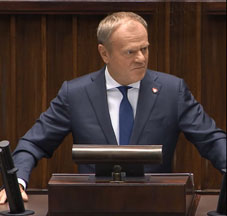
Tusk Pushes to End Georgia's Visa-Free Access, Botchorishvili Condemns Move
By Liza Mchedlidze
Frday, June 13, 2025
Polish Prime Minister Donald Tusk has announced efforts to rally support within the European Union to suspend or restrict Georgia's visa-free travel, citing concerns over democratic decline and growing migration. His remarks have triggered a strong backlash from Georgian officials, who accuse both Poland and the domestic opposition of working against the interests of Georgian citizens.
"I have already spoken out, intervened, and we are now working to build the necessary majority to limit or suspend visa-free travel for Georgia, along with other countries," Tusk said during a June 11 parliamentary session in Warsaw. "Yes, this is my intention while being fully aware that one-third of Georgians genuinely wish to share our values. But we know where the real problem lies."
Framing the issue within a broader debate on migration and democratic governance, Tusk added: "I strongly support restricting visa-free travel from countries, like Georgia, that no longer uphold basic democratic standards and from which migration presents a direct threat to legal and public order in our country and in Europe." He also claimed that 50 Georgian nationals were recently deported from Poland for committing various crimes.
In response, Georgian Foreign Minister Maka Botchorishvili condemned Tusk's comments as "regrettable" and "insulting," emphasizing that the vast majority of EU member states do not support ending visa-free access for Georgians.
"The issue does not have many supporters in Brussels, but work is still ongoing to use this issue against the interests of the Georgian people," Botchorishvili told reporters, in remarks later released by the Foreign Ministry. "Georgia has done everything to ensure that our citizens can travel freely to the European Union."
Botchorishvili also accused Georgia's opposition of lobbying European institutions to target visa-free travel, claiming these efforts are politically motivated and coordinated with foreign allies.
"This is more like coordinated actions on the part of Poland," she said. "The opposition's visit to Brussels and attempts to use visa-free travel as a tool against Georgian citizens. These are the issues being used against Georgia's interests, especially when the opposition no longer has any resources inside the country."
The dispute adds to already strained relations between Tbilisi and Brussels. Georgia, an EU candidate country, has faced mounting criticism from European officials over its shift away from democratic norms. The ruling Georgian Dream party has come under fire for legislation targeting civil society and its use of force against pro-EU demonstrators.
Despite the friction, EU Ambassador to Georgia Pawel Herczynski recently reiterated that most member states oppose revoking visa-free access, saying, "We don't want to make ordinary people pay for the decisions made by their government."

